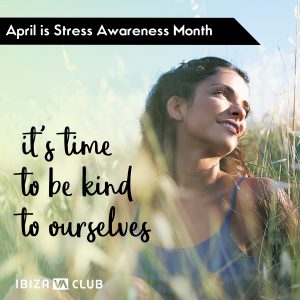Social distancing is still new, but we’re already all feeling the pressure. Loneliness, worry for our loved ones and ongoing uncertainty. It’s breeding ground for stress.
Protecting our mental wellbeing during social distancing is vital. Loneliness is one of the most obvious negative effects of social distancing, but stress is often overlooked. The pace at which we have all had to adapt to distancing measures is putting a lot of families and individuals under immense pressure. We’re all living day to day right now, uncertain of what is coming next.
April is Stress Awareness month, and there was never a better time to focus on it. Stress is a killer; causing damage to just about every body system if left unchecked. We all find ourselves marooned in our homes with limited access to the outside. It’s a scary and worrying time.
Not surprisingly people will be turning to anything that can reduce stress and help them navigate this unprecedented time in our lives.
Smoking is often cited as a ‘stress reliever’ and many smokers persist with smoking because they see it as a way to help them cope in tough times. In fact, the ‘calm’ a smoker feels when they smoke is a direct result of the Nicotine they have inhaled. The relief is only temporary and is quickly replaced by feelings of agitation as a result of Nicotine withdrawal. The more you smoke, the more addicted you become, and the more difficult the cravings are to manage. External stress may have been the trigger to start smoking, but it quickly switches to managing an addiction and satisfying the stress related to that and not the original anxiety.
Research into smoking and stress has shown that instead of helping people to relax, smoking actually increases anxiety and tension.8 Nicotine is highly addictive, but isn’t harmful when inhaled; it isn’t the Nicotine in cigarettes that causes the many catastrophic health issues related to smoking. 4,5,7 Nicotine withdrawal symptoms are very similar to the symptoms of anxiety, and once the craving has been satisfied it reinforces the feeling that smoking helps, and so the cycle continues. Smokers truly believe they are managing stress with smoking, when in fact all they are doing is putting extraordinary pressure on their bodies as they struggle to cope with the toxins inhaled as a result of burning tobacco. Smoking is NOT the answer to relieving stress.
Let’s help each other
The COVID-19 pandemic has forced the entire world to hit the pause button, and life as we know it has been turned on its head. One of the many positive things to come out of this is how communities all over the world are coming together to help each other get through this. Every day we see news of initiatives in communities to tackle loneliness.
We’re here to help where we can too. If you, or someone you know, wants to quit smoking but is worried about how to make the switch to vaping we can help. Smoking is a disaster for health, and while vaping isn’t risk free, it is proven to be 95% less harmful than smoking.1 Vaping also allows you to regulate your Nicotine intake putting you in control of the strength you use without the additional harm of smoking tobacco. It’s also cheaper! For more information on how we can help contact me at IVCservice@ibizavapeclub.com
STAY SAFE OUT THERE.

References
- McNeill, A. et al. Evidence update. A report commissioned by Public Health England (2019).
- McNeill, A. et al. Evidence review of e- cigarettes and heated tobacco products 2018. A report commissioned by Public Health England (2018).
- ASH Fact Sheet. Nicotine and Addiction. August 2018. Available from: http://ash.org.uk/category/information-and-resources/fact-sheets/ [Accessed January 2019]
- British Medical Journal. Nicotine and health 2014. Available from https://www.bmj.com/content/349/bmj.2014.7.0264rep.full [Accessed January 2019]
- Gov.UK. Four in 10 smokers incorrectly think Nicotine causes cancer. March 2018. Available from https://www.gov.uk/government/news/four-in-10-smokers-incorrectly-think-Nicotine-causes-cancer [Accessed January 2019]
- Adriani W, Macri S, Pacifici R, Laviola G. Peculiar vulnerability to Nicotine oral self-administration in mice during early adolescence. Neuropsychopharmacology 2002;27(2):212–24.
- Long-term effects of inhaled Nicotine. Waldum HL (et al), study for Department of Medicine, University Hospital, Tronheim, Norway. (1996)
- https://www.mentalhealth.org.uk/a-to-z/s/smoking-and-mental-health

Joanne Emmerson FCIM
Head of Marketing, Ibiza Club
Joanne is a fellow of the Royal Chartered Institute of Marketing and has 30+ years marketing experience. She has worked all around the world, is published in 7 countries and teaches marketing communication theory at Post Graduate level both in the UK and USA. She has worked alongside many government bodies, health organisations and national charities. ivcservice@ibizavapeclub.com
